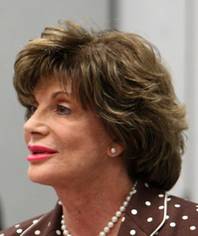Monday, May 24, 2010 | 2 a.m.
Reader poll
Related Document (.pdf)
Sun Archives
- Lawmakers push to regulate, tax online gaming (5-19-2010)
- With aggressive push, Internet gambling again in play (2-9-2010)
- Why casinos in Nevada won’t go online (for now) (8-20-2009)
- Will Web poker bust spark fight or flight? (6-15-2009)
- Poker players swarm site seeking input on big issues (5-19-2009)
- Web betting is wedge for Big Gaming (11-25-2008)
- Bush administration moves on Internet gaming band (11-12-2008)
- Gaming’s new frontier (11-23-2007)
- Online gaming in the shadows (7-17-2007)
Sun Coverage
At first glance, the 15-year debate on whether to regulate and tax Internet gambling appears to have evolved little from the initial standoff of morality and social costs on one side and libertarianism and financial need on the other.
And yet, last week’s congressional hearing on the subject is evidence that although some members of Congress are still uncomfortable with Internet gambling, the discussion about government-regulated online casinos has moved from “should we allow it” to “how do we best make this happen.”
It is, after all, a black-market business that has generated more than $100 billion since researchers began tracking it several years ago.
Although Internet gambling advocates cite growing support for regulation, the road ahead looks bumpy — in part because the interests of Nevada’s casino giants are different from those of their virtual counterparts.
During Wednesday’s House Ways and Means Committee hearing to discuss a bill by Washington Democratic Rep. Jim McDermott to tax Internet gambling, squabbles erupted over how to best tax an industry that’s ready, willing and able to pay.
McDermott’s bill is a companion to legislation introduced last year by online gambling champion Rep. Barney Frank, a Massachusetts Democrat, to legalize and regulate Web casinos on a federal level.
McDermott set out to raise up to $72 billion over 10 years by taxing online operators and gambling winnings. It’s an ambitious figure, some lawmakers say, as it assumes that all states will choose to participate, rather than opting out and banning local play. Of the total, the feds estimate raking in $42 billion, while state governments — a majority of them facing budget deficits — could receive up to $30 billion.
McDermott estimates more than half of that money would come from gamblers declaring taxable winnings. The legislation would require online casinos to send 1099 forms to the Internal Revenue Service that list winnings and losses. The IRS allows gamblers in casinos to deduct losses against winnings, although much activity — with the exception of big jackpots that require IRS disclosures — goes unreported.
Under the bill, online casinos would pay corporate income taxes because they would be required to locate computer servers and corporate offices in the United States.
In addition, Web casino operators would pay a quarter-percent tax on wagers and a 6 percent tax on the money gamblers deposit into online accounts before laying bets.
The deposit tax, one of a few sweeteners introduced by McDermott in March to garner support for the bill, would flow to states that agree to let residents gamble online and allow Internet gambling companies to set up shop in their states. Other countries that regulate Internet gambling use deposit taxes, but the idea isn’t going over too well in Nevada.

Shelley Berkley

Rep. Dean Heller
When Nevada Reps. Dean Heller, a Republican, and Shelley Berkley, a Democrat, argued against the tax Wednesday, they didn’t come right out and say it, but they were looking out for the interests of the state’s gaming companies.
Taxing deposit money regardless of whether it is being gambled would be like taxing a retailer for money customers bring into the store but don’t spend, Heller said at the hearing.
“What is the logic of that?” he said.
“I can’t understand this tax at all,” added Berkley, calling it a “barrier to entry” for Nevada companies.
Internet gambling operators are open to paying this tax, an effective alternative to the gambling revenue tax paid by most U.S. casinos, because it allows states to collect taxes from companies without having to figure out where gamblers are located when they place online bets, McDermott responded.
Although the tax might seem unfair because there is no purchase transaction involved, it levels the playing field by recognizing that online gambling operations have lower operating costs than brick-and-mortar casinos, which have armies of employees and capital intensive buildings, he added.
Responding to Heller’s objection, McDermott said gamblers wind up spending the money in their accounts anyway. It doesn’t sit there indefinitely.
Heller plugged local interests by questioning whether the creation of U.S.-based online casinos would cannibalize business from brick-and-mortar casinos. Nevada, he said, is reeling from recession and record unemployment.
Legalization is expected to create an estimated 32,000 American jobs that now go to other countries, McDermott countered.
Heller pressed on, questioning the federal regulatory system envisioned by the bill and the kinds of companies that might be allowed a coveted spot on this new playing field.
“The gold standard (for casino regulation) is obviously ... Nevada and the Gaming Control Board,” he said.
Nevada has the most experience licensing gambling operators while the feds lack any such experience, a fact that has been discussed by gaming attorneys who have suggested that the Treasury Department defer the task of investigation and licensing to the Nevada Gaming Control Board, which could benefit the state and create jobs.
Online poker lobbyist John Pappas said the disagreements distracted from the bigger picture, although he expects compromises will move the bill forward.
“We’ve got to first win the war on whether Internet gambling should be regulated before engaging in battle over how it should be taxed,” said Pappas, president of the Poker Players Alliance. “I think this was putting the cart a little before the horse.”
Frank’s legalization bill is still stuck in the House Financial Services Committee. Congress has had its hands full with debates on more pressing matters such as health care and banking reform. But Frank is chairman of the committee and expects to bring the bill to a vote by July.
Although the Ways and Means hearing was ostensibly about taxation, some of discussion rehashed the old polarizing debate.
Gambling opponent Rep. Bob Goodlatte, a Virginia Republican, initiated much of the debate, peppering the committee with arguments for upholding the federal prohibition of Internet betting.
Most state attorneys general oppose Internet gambling, and federal law enforcement agencies and many Americans do, too, in part because it can’t be effectively regulated, Goodlatte said.
Although gambling cheerleaders dismiss Goodlatte as an out-of-touch prohibitionist, some of his concerns were echoed by committee members who worried about whether online casinos would steal business from brick-and-mortar casinos in their states.
“There’s only so much discretionary income people have to spend,” said Rep. Earl Pomeroy, a Democrat from North Dakota, which has remote casinos on impoverished Indian reservations. “To think that we can gamble our way out of a recession (is) about as believable as thinking when you place a bet against the house, it’s an even-steven proposition.”
Most speakers at the hearing supported Internet gambling legalization, saying it makes sense to regulate and tax an activity that is widespread.
“I think we are denying reality” by continuing to ban it, Oregon Democratic Rep. Earl Blumenauer said. After supporting a 2006 bill further criminalizing Internet gambling, Blumenauer recently changed his position, supporting taxation and regulation to raise needed cash.
Supporters say such views have begun to take hold in Congress and that legalization, driven by advancing computer technology and greater acceptance of gambling, is inevitable.
That explains why, in the days before McDermott introduced his bill, the American Gaming Association changed its position from neutral to supportive of legalization under a strict regulatory system.
Even those brick-and-mortar casinos that were once wary of competition from virtual gambling halls want in on the action.
The association’s two biggest members, MGM Mirage and Harrah’s Entertainment, have been among the industry’s most vocal supporters of Internet gambling, as they have much to gain from establishing Web versions of popular casino brands. Some smaller companies needed convincing, however.
After a year of research and study, association members agreed there’s enough evidence that Internet gambling can be properly regulated, like it is in Europe, and it won’t hurt existing business, CEO Frank Fahrenkopf said.
“Six to 10 billion dollars are presently being bet by U.S. residents offshore,” Fahrenkopf said. “If any cannibalization was taking place, it was probably already taking place.”
Gambling is a declining revenue source relative to other casino amenities, he added, so companies are inclined to view online casinos as a new profit center rather than a drain.
“Many (companies) that were opposed to Internet gambling years ago have come to see the light,” Pappas said. “Progress and technology always win out. The bricks-and-mortar casinos don’t want to be left holding the bag.”

Join the Discussion:
Check this out for a full explanation of our conversion to the LiveFyre commenting system and instructions on how to sign up for an account.
Full comments policy